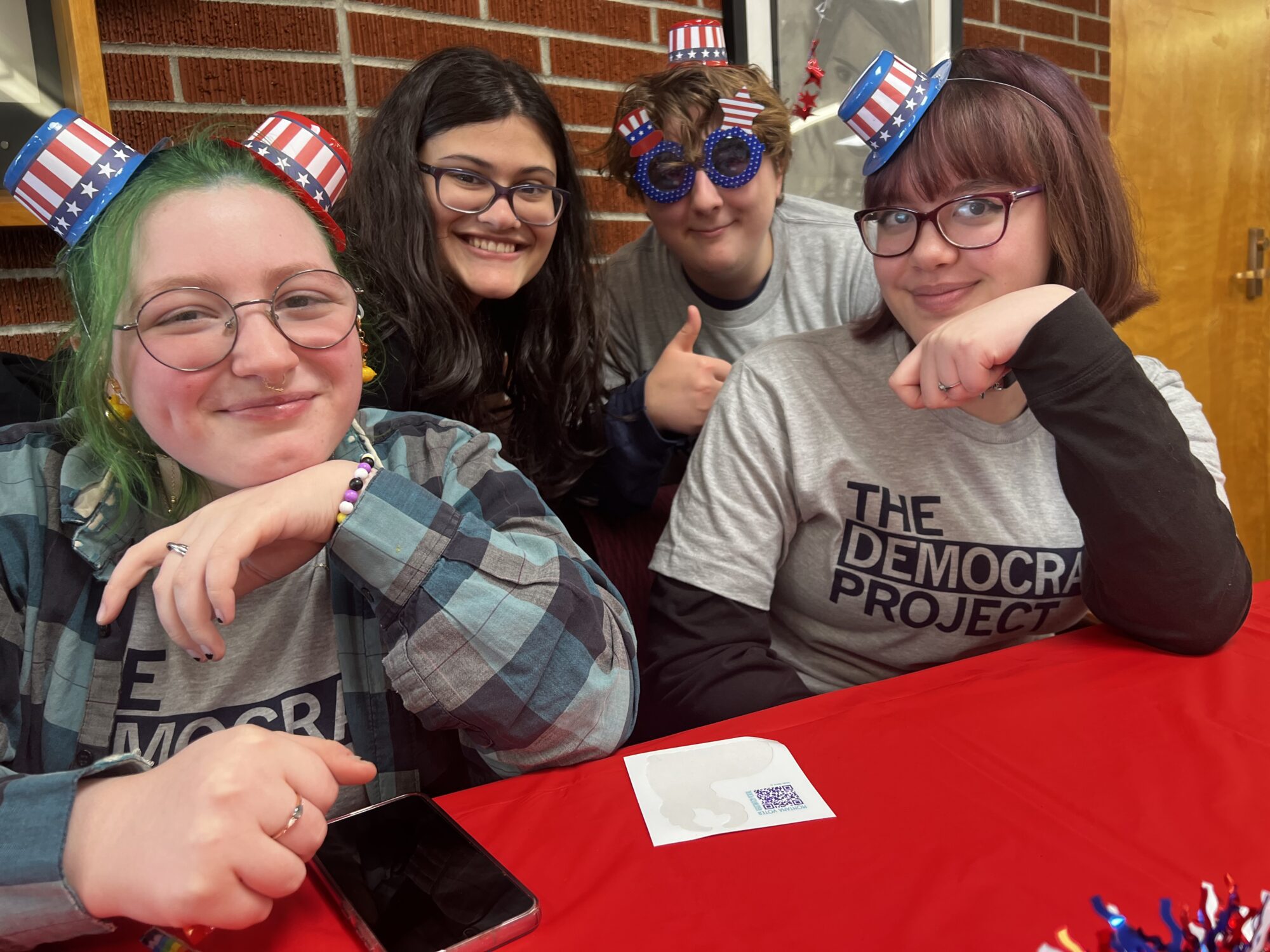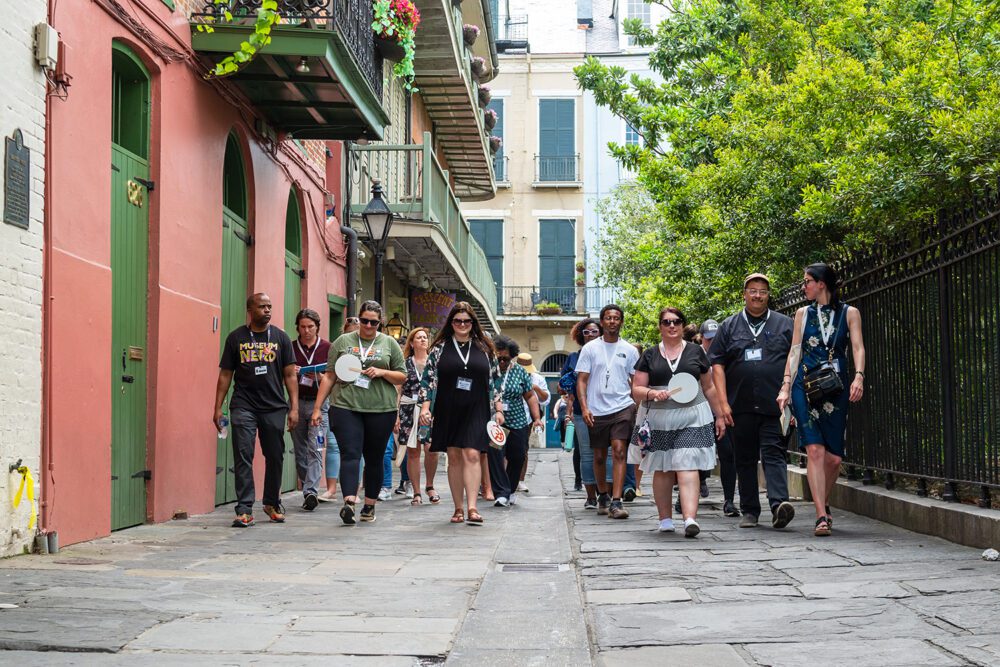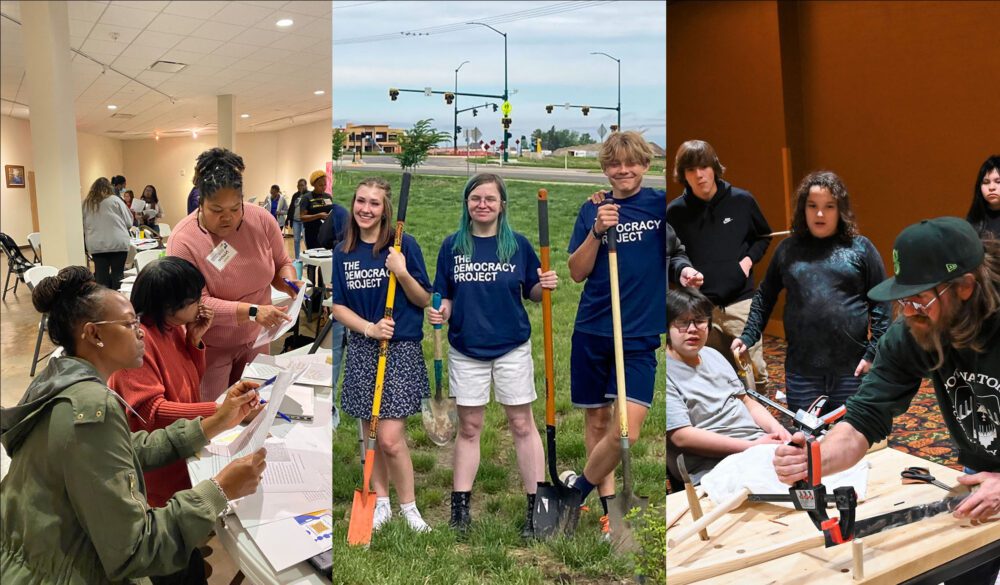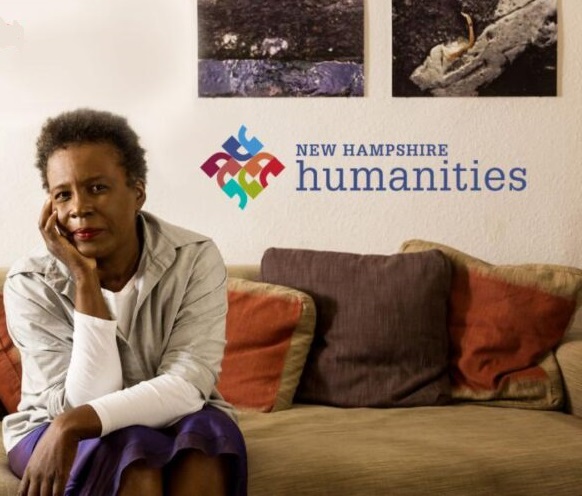Since 1982, the Federation has awarded the Schwartz Prize to up to three humanities councils for outstanding work in the public humanities each year. In this series, we are profiling the winners of the 2024 Schwartz Prize, starting with Humanities Montana.
Lewistown, MT (pop 6,149), a group of teens were asked to identify and address a need in their community. They decided to expand the city’s recycling program. After research and planning, they successfully brought a proposal before their City Commission and even recruited volunteers to staff the expansion. In Poplar, MT (pop 745), located on the Fort Peck Indian Reservation in the east of the state, another cohort of teens opted to created a resource closet in the school counselor’s office stocked with food and personal hygiene items for classmates in need. In Helena (pop 35, 203), teens wanted the state to support teen mental health in schools, so they wrote a bill and testified before the house education committee after a state representative put forward that bill. These are just three examples of the projects undertaken by groups of Montana teens enrolled in the Democracy Project, a program from Humanities Montana.
The Democracy Project is a teen-led, non-partisan initiative supported by local libraries and community partners, and its goal is to give teens the resources to meet community needs while learning about the role they can have in an evolving democracy. Through direct civic engagement, teens work for six months on projects they feel are vital to their community, ending with a public showcase. Heading into its fifth year, The Democracy Project has already seen over 30 groups across the state complete projects related to a wide range of issues, including traffic safety, creating greenspace, voter registration, Holocaust memorialization, air quality, food insecurity, and more. Each site also holds a voter registration drive in addition to their project. The program is privately funded through the Charles Engelhard Foundation.
“I’ve seen a really big commitment to this project because it’s bigger than themselves… I think teens understand that it’s going to increase social connection, promote resilience, and increase the well-being of all the people in our community.“
– Lori Smoker, Library Director, James E Shanley Tribal College Library, Poplar, MT
A video about the Democracy Project produced by Humanities Montana featuring participants, facilitators, and program staff.
So how does the program work? Montana libraries apply to host, and selected sites receive a $3,500 stipend to complete a project. Those funds can cover food, transportation, and significant purchases towards project goals including library infrastructure, books, subscriptions, and other resources. (Some sites have also fundraised matching funds using their stipend.) In towns where the library needs more time to build a teen audience, they can opt for a “soft launch” track, which comes with an extra $500 and five months of planning time.
Teens who join the six-month program work together under the guidance of their local librarian to develop a project that meets a community need. Thanks to a partnership between Humanities Montana and the Montana nonprofit Civics Under the Big Sky, all sites have access to interactive civics toolkits and curriculum that cover subjects like the Montana state constitution and media literacy. (In extremely rural and isolated communities across the state, like Circle, MT—pop 584—school districts struggle to attract and retain credentialed teachers; these toolkits offer a pathway for civics education to teens.) Humanities Montana also provides free speaker bookings for each site, including one from the 2023-2025 Montana Poet Laureate Chris La Tray (Métis).
Each group collaborates with local nonprofits and businesses, local government (county, city council, school boards, tribal councils) and state government, and state institutions from the legislature to the Montana State Library. For example, teens in Bozeman decided to create a greenspace/outdoor classroom adjacent to their school that would serve both students and community members. After developing a pitch, they presented to community stakeholders, from The Gallatin Valley Conservation District Board of Directors to the regional Ace Hardware store. They even built a fundraising website to support their efforts. A local landscape architecture studio heard about their plans and was so inspired by the project that they donated planning and design efforts as well as materials and labor costs to the teens’ project.
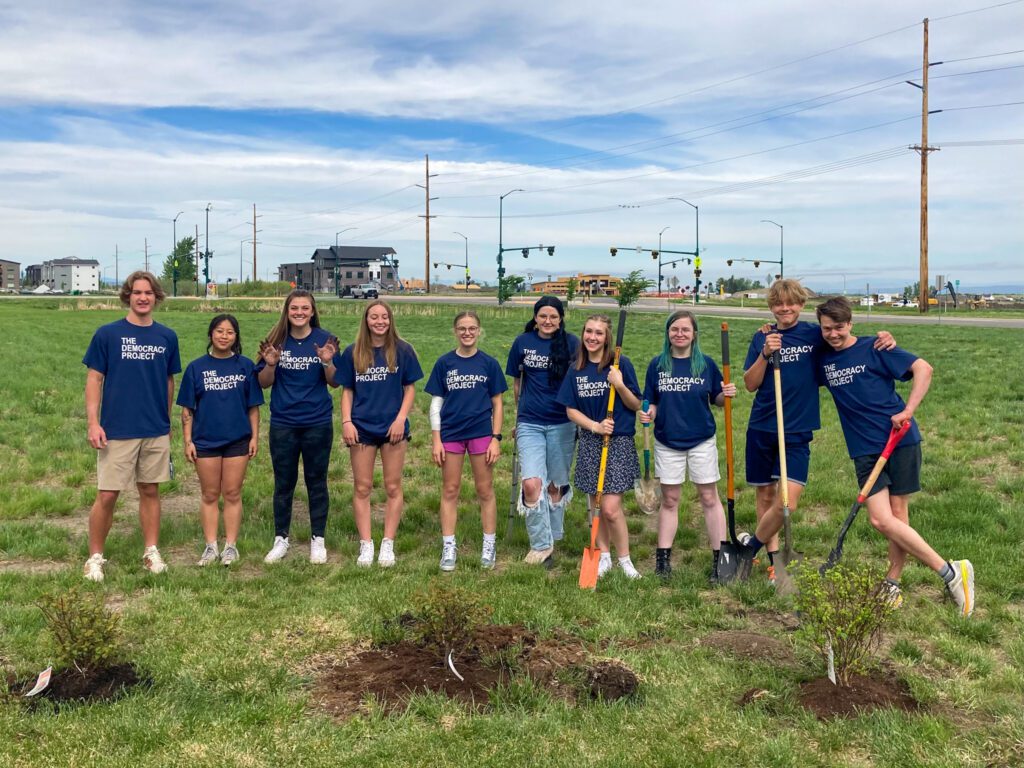
Democracy Project teens and their librarians also receive direct support from Humanities Montana staff, who—thanks to funding from Charles Engelhard Foundation—are able to make trips around the state each year to visit program sites. Each trip covers about 2,000 miles, bringing staff to all parts of the state, including Montana’s seven Indigenous nations. Beyond direct support of the Democracy Project, these visits also connect sites with other resources and programs from Humanities Montana. Librarians in the program receive support to travel to in-state and out of state conferences alongside other in-person professional development opportunities. The librarians also receive remote peer support through a monthly Zoom check-in with all cohort librarians statewide. Rural libraries often use part of their stipend to upgrade the hardware and software (like Zoom subscriptions) needed to connect across the state, improvements which lower barriers to access for other library users beyond the program.
“In my many years of being a librarian, working with the Democracy Project and its group of dedicated, caring teens who have been meeting all year long and using their time to write a House Bill and developing a website dedicated to Teen Mental Health has been the highlight of my career. It has been an honor to work with this group of forward-thinking young people. They give me hope.“
– Sherry Schlundt, former teen services librarian, Lewis and Clark Public Library, Helena MT (pop 35,203)
Jenny Bevill, Program Manager at Humanities Montana, discusses the program in an interview with the Federation at the 2024 National Humanities Conference.
After four full years of the program, the long-term ripple effects of this program are becoming clear. Teens, librarians, and their communities have continued using their new skills and connections to make positive changes, empowered by their Democracy Project experiences. One teen in Columbia Falls (pop 5,656) joined because they wanted to make a difference in their local community, but the experience, they said, “has ultimately led me to being interested in what’s happening at the state level. I decided to run a campaign to become a representative for a local house district.” And they weren’t the only Columbia Falls participant to take things to the next level after the program finished.
After the town participated in the Democracy Project in 2022, their librarian noticed that most of the teens who had become invested in the program had special needs and accessibility challenges. In a school culture where social life is focused on sports teams and 4H/Future Farmers of America, these teens were looking for a group to belong to, and The Democracy Project became their “team.” When the group volunteered to present at the Montana Library Conference in Butte, their principal drove them 232 miles to give their presentation. Many in the Columbia Falls group had never spoken in public and most of the teens had never had the opportunity to travel such a distance before, so this was an exciting and invaluable experience.
Inspired by their success and group cohesion, their librarian applied to host the Democracy Project again in 2023. They also applied for and received a $20,000 Transforming Communities Grant from the American Library Association to support their 2023 Democracy Project on anti-bullying efforts. As a result, the school was able to receive a year of gold-standard, school-wide anti-bullying training. The Democracy Project teens engaged collaboratively with the trainers to write anti-bullying lesson plans for administrators and teachers to implement in the classroom.
Participating in the Democracy Project opened the door for the teens in Colombia Falls to find a cause they were passionate about and actively work to change a school culture of bullying. For their public showcase they organized a Kindness Day. Despite nervousness about putting themselves out there by taking shifts staffing a table in the school lobby, the day turned out to be a huge success. Democracy Project teens, teachers, and their principal all wore pink in support of Pink Shirt Day, an international awareness day promoting anti-bullying. Classmates lined up to play kindness games. The Democracy Project teens ended up staying at the table the entire day, ignoring the assigned shift times so they could all be together.
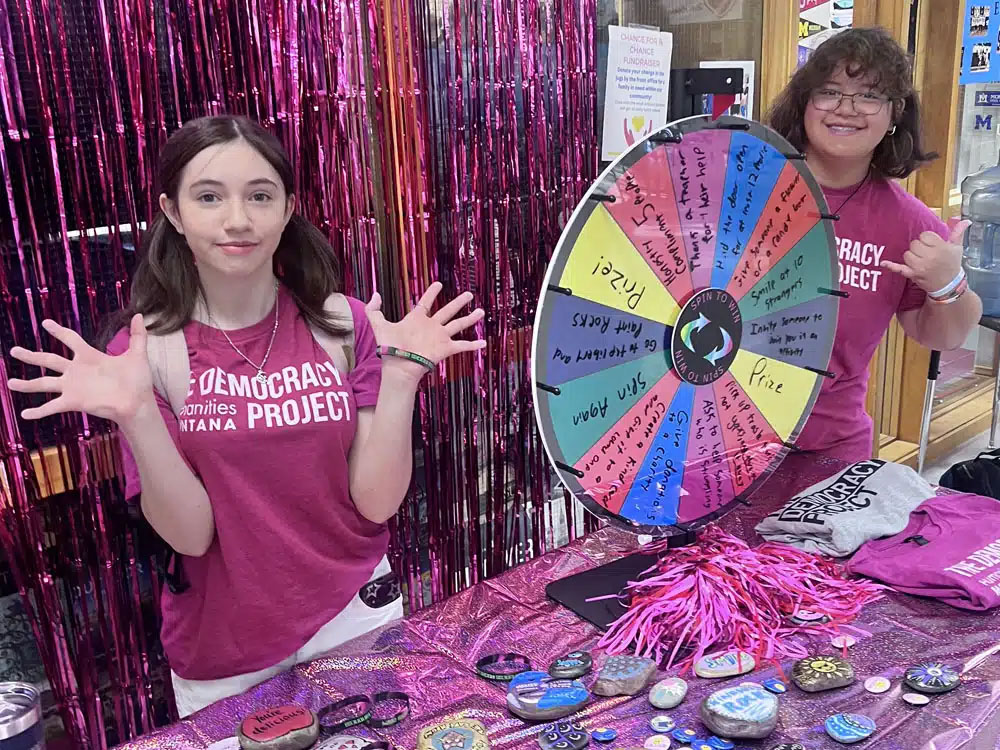
Learn More About the Humanities in Montana
Established in 1972, Humanities Montana is a nonprofit affiliate of the National Endowment for the Humanities, one of fifty-six independent humanities councils across the United States and its territories. Humanities Montana serves Montana’s multicultural communities through stories and conversation. For over 50 years, they have helped strengthen communities through grants and special programs that reach into every corner of the state. They produce, fund, create, and support humanities-based projects and programs, eye-opening cultural experiences, and meaningful conversations. They connect people, inspire ideas, and deepen mutual understanding.
Other Humanities Montana programs include Montana Conversations and Speakers in the Schools, where trained facilitators and experts lead workshops and conversations on topics like current affairs, untold histories, native cultures, literature, and more.
In 2020, Humanities Montana awarded nearly $420,000 in emergency CARES Act grants, helping 95 organizations retain employees, pay operational costs, and continue programming. In 2021, Humanities Montana awarded an additional $501,326 to aid the recovery of Montana’s cultural institutions.
In 2023, 10,308 Montanans; including students, youth, and adult audiences, attended 479 Humanities Montana programs.
Learn more about Humanities Montana’s impact here.
